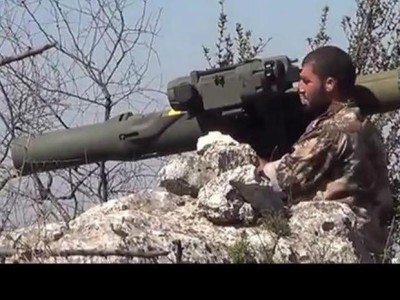Last week President Obama again pulled back from public support of Syria’s insurgency, saying, “We don’t have a strategy”.
However, on Sunday, there was another twist in the long-running story of whether the US is or is not intervening in the 41-month conflict. McClatchy News Service claimed that Washington and its partners are covertly supporting 40,000 insurgents in the fight against the Assad regime.
About a dozen Free Syrian Army commanders of fighters, many in groups larger than 2,000, are receiving weapons and material aid from the U.S. and other supportive groups. They’ve sent forces into Ikhtrin, north of Aleppo, to reinforce the positions of the FSA fighters now in intense battle against the Islamic State….
U.S. officials won’t say how many Syrian rebels they’ve trained, or even how many Syrian rebels they’re helping to equip. But extrapolating from the size of the units claimed by two commanders and the U.S. official’s comment that some are smaller and some larger, it appears that as many as 40,000 rebels are now receiving support from the U.S. and other supportive groups.
If true, that would mean Washington and other foreign backers are arming and training a significant minority of a Syrian insurgency roughly estimated at around 100,000 fighters.
But the story may be more about propaganda than reality — specifically, a battle between US officials and the highest levels of the opposition outside Syria.
The US assistance is not being supplied through the Supreme Military Council of the opposition Syrian National Coalition. Instead, it is being supplied directly to individual units, effectively cutting out the Council.
The head of the SMC, General Abdul-Ilah al-Bashir, complains, “The leadership of the FSA is American. The Americans are completely marginalizing the military staff. Not even non-lethal aid comes through this office.”
Bashir said 12 to 14 commanders in northern Syria and some 60 smaller groups in southern Syria are receiving the US assistance.
US officials confirmed Bashir’s claims, while blaming him for keeping too low a profile among commanders and for not fully staffing his office. And a “senior State Department official” pointed to an even more important allegation — sending supplies through the Council was ineffective because the assistance was “lost”:
I understand why al Bashir doesn’t like.[the arrangements]….He doesn’t get the authority and credibility from the commanders that he would have gotten if he had food and medical supplies and equipment to distribute….We recognize that that’s not perfect from his point of view.
It is perfect if what we’re trying to accomplish is to get equipment to the commanders rather than risk losing the stuff. We haven’t lost anything since we started doing business differently.
Commanders based in Reyhanli in southeast Turkey, near the Syrian border, spoke of the supply of US TOW anti-tank missiles, training of troops outside Syria, and funds from foreign backers allowing for salaries of $900 a month for fighters.
Colonel Jamil Radoon, who said he commands 2,400 troops inside Syria, told McClatchy that he does not report to the SMC, but to the Americans and other “friends of Syria” in the Military Operations Command in Reyhanli.
“If we need any military advice or information, (the U.S. and supporters) offer it,” echoed Captain Iyad Shamsi, an officer from the 2,400-member Asala and Tanmiah Front. “This enables us to be more professional. The most important thing is that they provide training.”
Despite the claims of the commanders, sources speak of continuing difficulties over shortages of arms and ammunition. The McClatchy article indicates this could be an issue of coordination: “The arrangement doesn’t appear to lend itself to developing a clear, cohesive strategy”. It could be that, despite the PR that the US is providing military aid despite Obama’s public reticence, Washington is still keeping limits on both the scale and power of the military equipment.
And the critical baseline remains: the US is only backing a small provision of anti-tank weaponry and is maintaining a ban on anti-aircraft missiles.
A “senior US official” notes the complaint of the insurgents and opposition that success cannot be assured without defense from the Assad regime’s warplanes: “They’re convinced (of that). I’m not going to disagree. I never heard our side disagree.”

